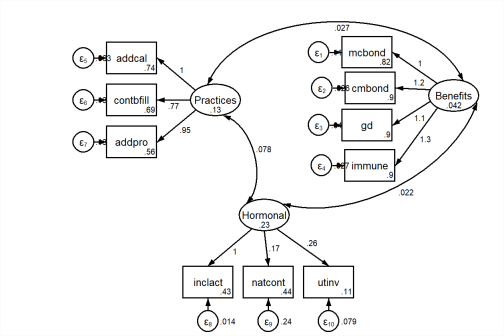-
Home
-
About JCTR
-
Gold Open Access
-
Issues
-
Editorial board
-
Author guidelines
-
Publication fees
-
Online first
-
Special issues
-
News
-
Publication ethics
-
Partners
-
Submit your manuscript
-
Submit your review report
-
Editorial Office
-

This work is licensed under a Creative Commons Attribution-NonCommercial 4.0 International License. ISSN print: 2382-6533 ISSN online: 2424-810X
Volume 8 Issue 1
Development and validation of scale assessing the knowledge about breast feeding benefits and practices among antenatal and postnatal mothers in South India
Yuvaraj Krishnamoorthy, Rajan Rushender*, Ameenah Anwar Hussain Siraja
Krishnamoorthy et al. J Clin Transl Res 2022; 8(1):6
Published online: January 25, 2022
Abstract
Background: Developing a scale to address the breastfeeding benefits and practices among antenatal & postnatal mothers is important as it helps in evaluating the change in the behaviour, attitude and practice with appropriate health education.
Aim: This study was done to develop and validate a scale to assess the knowledge about the breastfeeding benefits and practices in Tamil language among antenatal and postnatal mothers belonging to rural areas of Chengalpattu, South India
Methods: We developed a scale to assess the knowledge about the benefits and practices of breastfeeding through literature review and expert opinion. Final version was administered among 377 antenatal and postnatal mothers in selected villages of rural Chengalpattu, South India. Construct validation was evaluated through principal component analysis (PCA). Confirmatory factor analysis was performed to check the goodness-of-fit of results. Internal consistency was evaluated through the Cronbach’s alpha co-efficient.
Results: A total of 11 questions was finalized in the questionnaire following face and content validity. In PCA, three factor model was obtained with the eigen values of 4.18, 1.91 and 1.48 respectively. These three factors were able to explain for about 68.9% of the variance. Goodness‑of‑fit indices revealed satisfactory CFIs (0.81), TLI (0.73), SRMR (0.11) and RMSEA (0.14). The reliability co-efficient for the questionnaire was 0.80.
Conclusion: We have developed an internally valid and reliable tool for evaluating the knowledge about breastfeeding benefits and practices. The scale should thus facilitate and fast-track the development of a structured breastfeeding educational program for antenatal and postnatal mothers receiving care at the primary health care level.
Relevance for patients: This questionnaire allows for the objective monitoring of effectiveness of educational activities and also help in comparing the efficiency of various educational models targeting the antenatal and postnatal mothers.

DOI: http://dx.doi.org/10.18053/jctres.08.202201.006
Author affiliation
1. Department of Community Medicine, ESIC Medical College and PGIMSR, K.K. Nagar, Chennai, India
2. Department of Community Medicine, SRM Medical College Hospital & Research Centre, Kattankulathur-6032203, Kanchipuram, Chennai, Tamil Nadu, India
3. SRM Institute of Science and Technology, SRM Nagar, Kattankulathur-6032203, Kanchipuram, Chennai, Tamil Nadu, India
*Corresponding author
Rajan Rushender
Department of Community Medicine,
SRM Medical College Hospital & Research Centre, Kattankulathur-6032203, Kanchipuram, Chennai, Tamil Nadu, India
Tel: +91 9486150944
Email: chiraru@hotmail.com
Handling editor:
Michal Heger
Department of Pharmaceutics, Utrecht University, the Netherlands
Department of Pharmaceutics, Jiaxing University Medical College, Zhejiang, China

